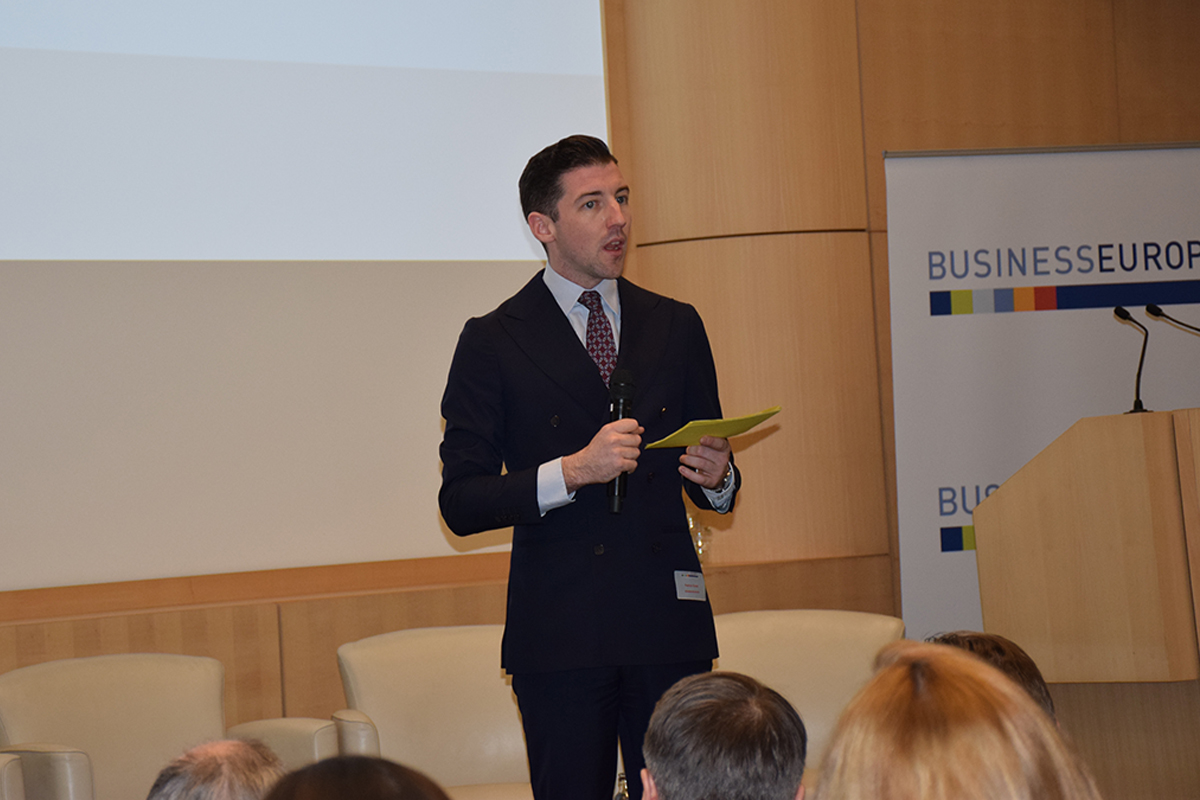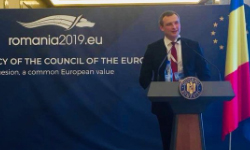BusinessEurope Headlines No. 2019-14
Our comment: The digital revolution - Europe’s ambition

By Patrick Grant, Adviser on the Digital Economy
The 4th industrial revolution is well underway. It will build on digitalisation. Advances in technology have progressed in the past 30 years. All sectors have embarked on the journey of digitalisation. The next phase will build on this progress through advances in connectivity and communication between technologies. Machines and devices will be brought together through cyberspace to interact in a complete environment that delivers seamless solutions. 5G is on our doorstep. Permitting mass traffic at lower latencies presents it as the catalyst of this new age.
But where is Europe in this global digital race? At the end of this legislature we find ourselves carefully determining our digital personality. We have opened internal borders to enable data to flow freely and updated our investment rules for telecommunications. Both should give our waning digital infrastructure the conditions for incentivising investment that it greatly needs. Not only vital for Europe to lead in key strategic digital areas (e.g. blockchain and micro-electronics) but also to give citizens access to opportunities digital affords. Europe will need to build on this progress as it rolls-out 5G so that advances in transportation, health and resource efficiency can be achieved.
But evasive forces are in play. Some competitors share our values, others do not. Cyber-attacks are on the rise and becoming detrimental to Europe’s welfare. Cybersecurity schemes will contribute to raise Europe’s cyber-capacities but more is needed to counter dangers that cyber-espionage presents. No longer are attacks simple malware disruptions. Nor are the actors involved individuals attempting to gain profit alone. Organised state-funded cyber-espionage threatens Europe’s IP, critical infrastructure and public institutions. A coordinated response to deter hostile actors is required. This will enable trust for businesses to continue to invest and consumers to remain protected.
Consumer preference is constantly in flux. But privacy is a staple diet for any citizen accessing a service. Europe has progressed the data economy for its citizens and businesses have responded. The GDPR has been fully implemented for nearly a year. It leads the way in setting the global gold standard for data protection. Businesses have grasped this privacy sea-change with vigour offering consumers control and transparency over how their data is processed. But this is threatened by the on-going sleepwalk into ePrivacy. What began as a laudable aim to update rules to match the trajectory of technology and its use currently represents a wrong turn that would highly damage achieving Europe’s digital goals. Policymakers need a holistic and “digital by default” approach. Individual initiatives should link across all policy areas understanding that success relies on the relationship between each other and whether together they achieve goals such as fully digitalising Europe’s manufacturing sector or leading in AI.
As automation proliferates, the existing digital skills gap in Europe becomes ever more important to close. This revolution offers efficiency gains making work-life balances more favourable but tasks will also change. This will benefit workers enabling them to fulfil safer and more rewarding roles. But basic and advanced digital skills are needed to enable us to take up the tasks of tomorrow. While Europe recognises the importance of augmented human capital through delivering its Ethical Guidelines for Artificial Intelligence (AI) it still needs to recognise that greater investment in human capital itself is needed to promote digital skills and aid critical decision making. Up-skilling and lifelong learning should be championed to ensure we are equipped to thrive.
Europe’s digital identity stands between innovative freedom to develop, collaborate, research and test, while standing up for European values to take society with it. Markets should be monitored and fostered. If failures are understood, actions should attempt to adapt existing frameworks before entirely new rules are put in place. Strengthening industry, policy makers and civil society collaboration can enable Europe to take on the dynamic personality it will need to react to these fast-moving changes.
You will find more of our digital ambitions for 2019-2024 – here.
![]() Contact: Patrick Grant
Contact: Patrick Grant
European Labour Authority should foster cooperation and information exchange
 One of the first tasks of the European Labour Authority (ELA), once a regulation has entered into force, should be a focus on fostering cooperation and information exchange between EU Member States as well as providing the necessary information and services to employers and workers about the applicable rules in various situations of cross-border labour mobility within Europe. This was the main message given by Maxime Cerutti, Director of Social Affairs, at a conference organised by the Socialists and Democrats Group in the European Parliament on 11 April. As part of this, it is important to develop comparable and consistent statistical data at the national level. ELA’s activities should be demand-driven. They should respect the diversity of practice in Member States in terms of labour inspections and industrial relations. The ELA regulation is expected to enter into force by the end of June.
One of the first tasks of the European Labour Authority (ELA), once a regulation has entered into force, should be a focus on fostering cooperation and information exchange between EU Member States as well as providing the necessary information and services to employers and workers about the applicable rules in various situations of cross-border labour mobility within Europe. This was the main message given by Maxime Cerutti, Director of Social Affairs, at a conference organised by the Socialists and Democrats Group in the European Parliament on 11 April. As part of this, it is important to develop comparable and consistent statistical data at the national level. ELA’s activities should be demand-driven. They should respect the diversity of practice in Member States in terms of labour inspections and industrial relations. The ELA regulation is expected to enter into force by the end of June.
Contact: Robert Plummer
Support for social partners’ capacity building: a priority for ESF+
 Social partners have a unique labour market perspective and, in many EU Member States, an institutional role that distinguishes them from other actors. To fully play their role in the European Semester process and the implementation of EU social dialogue instruments, the European Commission and Member States should take concrete steps to enhance the capacity of national social partners in a number of countries where this is highly needed. A key vehicle for this to happen is to mobilise the European Social Fund Plus (ESF+), in line with the Commission’s country analysis in the European Semester context. This was the main message given by Rebekah Smith, Deputy Director for Social Affairs, at a conference on the ESF+ in Bucharest on 11 April. As part of the ESF committee, BusinessEurope will also work in the coming months with the Commission, the ESF managing authorities, and the other social partners to improve the code of conduct on partnership and the partnership principle for the funds that are allocated under shared management.
Social partners have a unique labour market perspective and, in many EU Member States, an institutional role that distinguishes them from other actors. To fully play their role in the European Semester process and the implementation of EU social dialogue instruments, the European Commission and Member States should take concrete steps to enhance the capacity of national social partners in a number of countries where this is highly needed. A key vehicle for this to happen is to mobilise the European Social Fund Plus (ESF+), in line with the Commission’s country analysis in the European Semester context. This was the main message given by Rebekah Smith, Deputy Director for Social Affairs, at a conference on the ESF+ in Bucharest on 11 April. As part of the ESF committee, BusinessEurope will also work in the coming months with the Commission, the ESF managing authorities, and the other social partners to improve the code of conduct on partnership and the partnership principle for the funds that are allocated under shared management.
Contact: Rebekah Smith
Better regulation agenda should be deepened
 “We have a good foundation in place: now the better regulation programme has to be further developed and become permanent.” This was the main message of Christoph Bausch, Chair of BusinessEurope’s Better Regulation Working Group, during a meeting of directors and experts of Better Regulation on 11-12 April in Bucharest. “Better Regulation is not only a matter for the European Commission, but should be carried by all, including the co-legislators,” he added. Basje Bender, Adviser for the Internal Market Department, further emphasized the importance of transparent transposition of EU directives, increased opening of the trilogue process, and of evidence-informed decision making by the Commission and the co-legislators. The Commission published a stocktaking on better regulation on 15 April, which partially addresses these issues.
“We have a good foundation in place: now the better regulation programme has to be further developed and become permanent.” This was the main message of Christoph Bausch, Chair of BusinessEurope’s Better Regulation Working Group, during a meeting of directors and experts of Better Regulation on 11-12 April in Bucharest. “Better Regulation is not only a matter for the European Commission, but should be carried by all, including the co-legislators,” he added. Basje Bender, Adviser for the Internal Market Department, further emphasized the importance of transparent transposition of EU directives, increased opening of the trilogue process, and of evidence-informed decision making by the Commission and the co-legislators. The Commission published a stocktaking on better regulation on 15 April, which partially addresses these issues.
![]() Contact: Basje Bender and Jonathan Gray
Contact: Basje Bender and Jonathan Gray
Calendar
- 2 May: Headlines will be back, after Easter break
- 4 May: Open Day of the European institutions in Brussels
- 6-7 May: EBS 2019: Tomorrow's Europe
Reminder: please take a look at our revised privacy policy